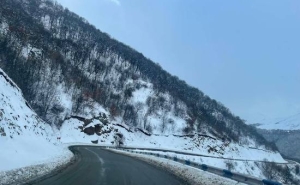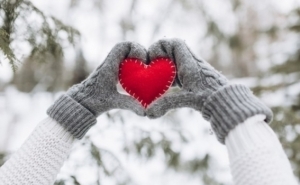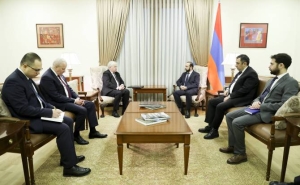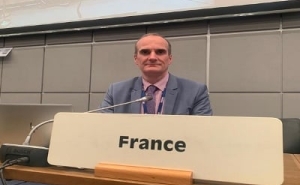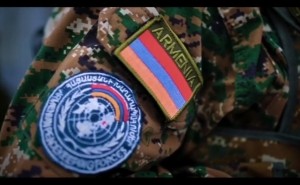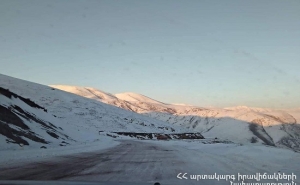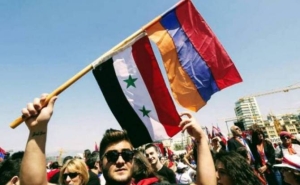"Armenian Revolutionary Federation" Party and Its Foreign Policy Priorities: Interview with Giro Manoyan (EXCLUSIVE)

As a result of April 2 Parliamentary elections of the RA 4 political forces will enter the RA National Assembly. These forces will define the foreign political course of the country. "Armedia" IAA presents interviews with the representatives of political forces conducted during the campaign on their foreign policy priorities.
"Armedia’’ IAA presents an exclusive interview with the head of the Armenian Cause Office of ARF Giro Manoyan.
- Mr. Manoyan, will you, please, name the three main priorities of the foreign policy directions of your political power?
- The first one is pro-Armenian and Armenian-centered politics, that is to say not any inclination towards this or that camp, but a foreign policy that is in our national state interests.
The second one mainly refers to relations with our neighbors, to the settlement of Karabakh issue. We think that Armenia should also work in the direction of the recognition of Artsakh. For that purpose Armenia should also carry out work to the process of recognition of Artsakh Republic by Armenia and that is why we have said, it is long time we are insisting that Armenia should sign a military-political cooperation agreement with Artsakh. This will, to a certain extent, increase the level of recognition and in such case it will be easier to turn to other countries for the recognition of Artsakh.
As for the relations with Turkey, we consider that in general, irrespective of having or not having relations with Turkey, Armenia should work in the direction of Genocide recognition.
The fourth one is deepening Armenia-Georgia relations, so as it also helps to improve the situation of Armenians living in Javakhk or in Georgia, in general, to protect their rights.
- What is your position on Karabakh conflict settlement process?
- We think that in the end Artsakh should be united with Armenia, the movement started for that purpose. In 1991, in fact, for tactical purposes on the basis of the Soviet laws Artsakh was declared independent. According to us the declaration of independence and its recognition are only milestones in the process of its reunification with Armenia. It is towards this direction that we should work. That’s why it is necessary to even more develop the basis for military-political cooperation agreement. This is something we have talked much about. The President of Armenia during the April war last year declared that he has tasked the Foreign Ministry to prepare such a document. According to our information the document is ready, but as it is said, they wait for a proper time to sign it.
The proper time for us had come – first it was during the last year war, when the President declared about it. Second it was after the April war, when two meetings between the two Presidents with the participation of the OSCE MG Co-Chairs, even with the representatives of the Co-Chairing countries took place, during which agreements were reached, but those agreements are not being implemented because of Azerbaijan’s behavior. This is enough to sign such an agreement between Armenia and Artsakh.
We think that we should try to settle the issue in a peaceful way. But by saying in a peaceful way does not mean that Azerbaijan should agree: there have been other conflicts in the world, when the world, after a short period – not like our case that 20 years negotiations are going on – decided saying that one side of the conflict does not change its approach, will not change (this refers to Kosovo conflict), thus we will take certain steps and those steps mainly referred to the recognition of Kosovo.
We should work in that direction as well.
- Do you consider it possible to restore the Armenian-Turkish relations in the near future? What is the key to progress in this direction? And what steps should be taken for the international recognition of the Armenian Genocide?
- The international recognition of Genocide has advanced greatly. It can advance even more if more countries recognize. For that reason in addition to the work in that direction it is important to raise the question of compensation. As in the case of Artsakh we, as a party, work in that direction as well, but the state should already start working in that direction. We as a party have taken certain steps in the direction of compensation, we also know that the state also has certain initiatives, but the state should be more active in that direction – defining the question of compensation, finding ways, combining these activities with other actors.
It is not the case that the state can or should do everything, but it would be right, that the state combines, controls all this. That is why the state should be active in this direction.
- What is your approach towards Armenia’s integration processes? How do you see the development of Armenia's bilateral relations with the US, the Russian Federation and with individual European countries?
- Inside the country, as a system, a direction for the development of the society, we think that the correct direction is the European one. We should follow that direction, localize, because we are European as a civilization. Work should be done with the European Union in that direction. Of course, it is also correct to work in the direction of economic cooperation with the EU.
Until now we have not used the opportunities that we have with the EU fully. It is also necessary to carry out certain internal changes – to increase the quality of the products and make them correspond to the EU criteria, so as we are able to enter the European market. Now we have such products, but their number is limited. There is an opportunity to do more and we should do more with individual European states and with the EU in general.
As for the EAEU, we have been in favor of becoming its member. We have criticized the first announcements of the Presidents of the RA and Russia, as necessary discussions and consultations were not made with the RA political forces and the society. But when that moment came and we were to express our stance, we came up in favor of it. This does not mean that everything should go very smoothly. We also see that in the Union there are countries, which carry out pro-Azerbaijani policy, which is bad for our relations. Knowing all this, however, we should continue that integration. Certainly, we should work also with the neighboring or near countries, which are not EAEU members.
It is important and in that we also had our role – the Foreign Ministry at last has a deputy minister on foreign trade. That is to say, it is necessary that the foreign trade becomes a part of our foreign policy, but for that it is necessary to have high quality product and that we do not remain only an importing country.
- How do you see the development of the relations of the RA with the neighboring countries, particularly with Iran and Georgia? What steps are needed in this direction?
- We stress the importance of Georgia in these elections. Before their parliamentary elections we have come up with certain initiatives for establishing relations with their circles and after our elections we will continue those relations. There is a problem for supporting the implementation of the rights of the Armenians in Javakhq and in Georgia, in general.
As for Iran, of course, we should make our relations with that country even closer, deepen economic and other cooperation. New initiatives should be undertaken towards regional projects. A lot has been talked about several issues like pipeline, railway. All these things can be carried out from a political point, only their practical implementation is left. In this regard we should be active and expect activeness also from the Iranian side. Again intensification of the relations between Iran and the West can be worrying for us.
- What are your political force’s views on regional security issues?
-By saying regional, if you mean the South Caucasus or Transcaucasia, then it is a region, which is a meeting place of different camps. It is necessary that the place does not become a place of clashes, which will harm the people living in the region, the recognized and non-recognized countries. In that regard we think that we should even more deepen our relations with our strategic ally. However, we should also deepen our relations in other directions, if possible with some European directions, with NATO without putting the question of membership. Our approach is that if we are a part of alliance it is not against others, but it is for security. With this approach we should strengthen our relations, also explain the other side not to feel hurt and continue dealing with our security.
If we look broader – Middle East, Syria, Iraq, Turkey, it should be said that there is uncertainty, but we should also actively work in those directions, especially in case of Syria and Iraq, where we have communities. Though we have a community in Turkey as well, we do not have diplomatic relations with that country. We should act in these directions as well. There is no need to become a side of something, but for the sake of security issues and for serving the interests of our compatriots in those countries, we should be active.
- How do you see the development of the Armenia-Diaspora cooperation? What should be the priorities of the overall agenda of this relationship?
- We are the only party participating in these elections that has its institutions in the RA, in Artsakh and in around thirty other countries. That is why our approach is objective, that is to say, we know what we are talking about and what we can do.
It is necessary to make the Diaspora become a participant of the developments of all the spheres of the RA. Yes, in some spheres the Diaspora has its participation, but it is clear that it is not a homogeneous unit, we are talking in general. Yes, by becoming members of various structures, individually or in other way our compatriots living abroad have their participation in the internal issues of the RA, but it is necessary that they have also their participation in the political processes as well. The shortest way to it is dual citizenship.
Naturally, on one hand we should bring the situation of the country at a sufficient level, on the other hand carry out work for repatriation – of those, who were born in the RA, but left and those, who were not born in the RA. This, besides solving demographic problems, will also contribute to the improvement of the economic situation in the country.
In case of Diaspora, we should show an individual approach to each side, not considering it a homogeneous one.
Other materials on this subject
- RA President: Armenia Has No Longer Individual-Centered Government Our people witnessed the advantage of it, after the election, when for the first time in the history people did not gather and say they would make a revolution.
- The New Parliament Will Carry Out Multi-Vector and Balanced Foreign Policy In regard with Karabakh conflict, the new Parliament will have a joint approach – to resolve the conflict through peaceful negotiations. Nevertheless, in the approaches of the 4 political forces there...
- Post-Election Armenia: Changes Are Recorded in the Political Culture These elections were obsereved by an unprecedented number of observers, including both international observers and local ones, as well as our compatriots from Diaspora. This means that more representatives...
- Only 1.65% of the Armenian Voters Expressed Themselves in Favor of Great Concessions on Karabakh Issue It should be mentioned that the least votes received the approach adopted by "Congress-PPA" party, which supposed great concessions. Instead, the voters supported the settlement of the conflict with negotiations...
- What Relations with the Diaspora Did the RA Citizens Choose? Armenian Revolutionary Federation, which received 103,48 votes, thinks that the Armenian Diaspora should be fully integrated in the development of Armenian statehood.
-
 17:08
17:08The regular session of the Anti-corruption Policy Council takes place in Jermuk
-
 15:05
15:05The Prime Minister sends congratulatory messages to the supreme leader of Iran and the President of Iran
-
 11:11
11:11Armenia sends earthquake aid to Turkey
-
 10:43
10:43Commemoration of the Pontiff St. Sahak Partev
-
 09:16
09:16Some roads are closed and difficult to pass in Armenia
-
 19:55
19:55Phone conversation of the Foreign Minister of Armenia with the U.S. Assistant Secretary of State for European and Eurasian Affairs
-
 18:30
18:30Prime Minister Pashinyan and President Khachaturyan meet
-
 18:20
18:20Ararat Mirzoyan with Co-Chairman of the OSCE Minsk Group of France Brice Roquefeuil
-
 17:01
17:01Humans could land on Mars within 10 years, Musk predicts
-
 16:45
16:45France, US urge 'immediate' end to Nagorno Karabakh blockade
-
 16:01
16:01Blockaded Nagorno Karabakh launches fundraiser to support quake-hit Syria
-
 15:59
15:59Earthquake death toll in Turkey rises to 18,342
-
 15:43
15:43Ararat Mirzoyan Held a Telephone Conversation with Sergey Lavrov
-
 15:06
15:06French president rules out fighter jet supplies to Ukraine in near future
-
 14:47
14:475 Day Weather Forecast in Armenia
-
 14:44
14:44President Vahagn Khachaturyan wrote a note in the book of condolences opened in the Embassy of Syria in Armenia
-
 14:20
14:20Azerbaijan’s provocations impede establishment of peace and stability – Armenian FM tells Russian Co-Chair of OSCE MG
-
 12:57
12:57France representation to OSCE: Paris calls on Azerbaijan to restore freedom of movement through Lachin corridor
-
 11:40
11:40Command of Kosovo forces highly appreciated preparation of Armenian peacekeepers
-
 10:16
10:16The United States withdrew from sanctions against Syria for six months the provision of assistance after the earthquake
day
week
month
Humidity: %
Wind: km/h


